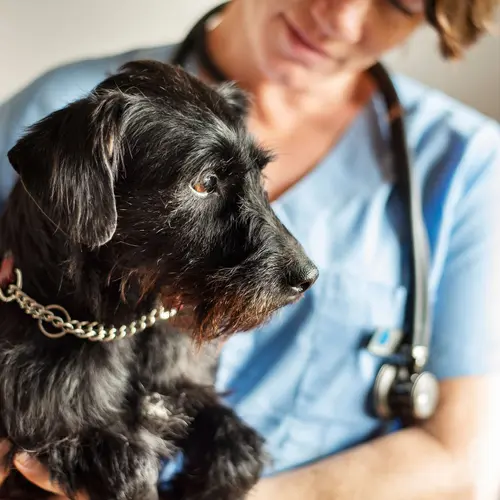If you’ve eaten yogurt, you’ve probably heard of probiotics. Are they safe for dogs? Should you feed your dog probiotic yogurt or a powder or pill?
What are Probiotics for Dogs?
Probiotics are friendly bacteria. Dogs and animals have billions of them in their stomach to help fight infections, make the immune system stronger, help digest food, and make vitamins and nutrients. This is called the microbiome and a healthy dog needs a healthy microbiome.
Changes in the microbiome can make dogs sick in different ways. This can include:
These changes can be caused by many things, including:
- Antibiotics
- Changes in food
- Weaning
- Stress
- Infections
- Parasites
- High carbohydrate diet
- Eating spoiled food
If your dog seems to get sick often, it could be caused by changes in their microbiome. It's a good idea to talk to your vet.
Types of Probiotics in Dogs
Dogs usually have certain types of friendly bacteria in their intestines. These include:
- Lactobacillus acidophilus
- Lactobacillus casei
- Bifidobacterium breve
- Enterococcus faecium
- Bifidobacterium lactis
In order to keep these bacteria happy, dogs also need prebiotics to feed the bacteria and help them grow. Prebiotics are nutrients that are found in food.
What Are the Best Probiotics for Dogs?
There are different types of probiotics for dogs, including food-based, powders, and pills.
Foods with probiotics for dogs. A good source of natural probiotics for dogs is yogurt or kefir with live cultures. Sometimes certain brands use cultures to make yogurt or kefir, but they are not probiotics. Yogurt and kefir may also contain artificial sweeteners, which can be dangerous for dogs. Dogs should only eat plain yogurt with no artificial sweeteners.
Dog foods with probiotics. Some dog foods have added probiotics. This might be an easier way to give your dog probiotics. It’s important to also look for prebiotics in the food that will feed the friendly bacteria.
Bacteria are sensitive to temperature, air, and moisture. This means the way dog food is made, how probiotics are added, and the type of food can all change the quality of the food and probiotics.
Probiotic treats. Soft treats that contain probiotics might be the easiest way to give your dog a dose of them. Some treats don’t contain live probiotics and might also have additives and extra preservatives.
Pills. Probiotic capsules are also available. You can hide a pill in canned food or a treat like peanut butter and give it to your dog. Some dogs don’t take pills very well even when they’re in treats. Your dog may spit pills out so you may need to put it directly in their mouth. This might be harder to give your dog.
Powders. Powdered probiotics are also available. Live probiotics in individual pockets are thought to be better. This controls exposure to air and moisture. Powdered probiotics might be harder to give to your dog, though.
Benefits of Probiotics for Dogs
A healthy balance of bacteria is important for healthy dogs. Probiotics for dogs have benefits that can help your dog digest food, make and absorb vitamins and minerals, and keep a strong immune system. Some research shows that giving friendly bacteria to your dog can help improve the following:
- Diarrhea
- Gas
- Obesity
- Bad breath
- Allergies
It’s important to know that while there is research on using probiotics in humans, there isn’t a lot of research on using probiotics in dogs. More studies are needed to know how probiotics might help your dog.
Before Giving Your Dog Probiotics
There are a few things to consider if you’re thinking about giving a probiotic to your dog.
Research. There isn’t much research on how probiotics affect dogs. Dogs have many types of bacteria in their gut, but a lot of research has only looked at single types of bacteria rather than several types and how they work together. This means we don’t fully know how probiotics in dogs work.
Quality. The way probiotics are made and packaged or how they are added to food and treats can change how they work. This could mean you might waste your money on a supplement that might not work.
Probiotics are sensitive. Probiotics are very sensitive to temperature, air, and moisture. Live probiotics are usually better and should be kept in the fridge, so make sure to read the labels.
Check the type of probiotic. There are many different types of probiotics. Make sure to read the label to know what type you’re giving your dog. Check with your vet to make sure it's the right kind.
Expiration date. After a certain amount of time, probiotics might not be as effective. Check the use-by date and make sure you finish up the probiotics before then.
Diet can affect the microbiome. Many dogs eat a high carbohydrate diet. This can cause changes to the bacteria in your dog’s stomach. It is important to talk to your vet to make sure your dog is getting the right kinds of food.

